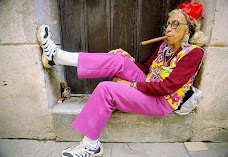
Well, Doc didn't get (or didn't appreciate) the use of humor in the previous post regarding genocide and America and Thanksgiving. In case he's not alone, I offer a brief explanation before expounding on the role of the jester:
Perhaps because I am supposedly between one-eighth and three-eighths Native American, my thoughts always turn at Thanksgiving to America's shamefully violent actions against the native population. So, the fact that most modern Americans (in my experience) mutter grateful prayers to a Christian deity for their bountiful lives and for the many blessings heaped upon them simply because they won the geographic and genetic lottery is offensive.
I guess the gratitude itself isn't offensive; rather it is the the fact that so many people take the time to recognize their blessings without an iota of thought (better yet: a moment of silence) given to the Native Americans we slaughtered and who still suffer more than any other group at our expense. So, that thought entered my head as a kind of fantasy I'd like to have expressed - had I been asked to "say grace" this Thanksgiving. Gratefully, no ritualistic practices of holding hands and saying prayers were forced upon me this year during the family gathering...
...which brings me to the Joker: his or her influence in history and in policy-making is under-appreciated. The jester's role in ancient China through the monarchies of Europe to the comedic artists of today has been to point out the flaws and dark underbellies of policy-making and culture. A criticism that might not be heard or otherwise heeded (or that might result in the beheading or imprisonment of a commoner) was allowed by the Fool. Today, writers and other artists ("The Daily Show with Jon Stewart" or the roasting of the President during the annual White House Correspondents' Association Dinner) are the descendants of this fine tradition of social criticism.
"The foolishness of the jester, whether in his odd appearance or his levity, implies that he is not passing judgment from on high, and this may be less galling than the "holier than thou" corrective of an earnest adviser. One of the most effective techniques the jester uses to point out his master's folly is allowing him to see it for himself. Rather than contradicting the king, the jester will agree with a harebrained scheme so wholeheartedly that the suggestion is taken to a logical extreme, highlighting its stupidity. The king can then decide for himself that maybe it wasn't such a good idea after all." [Excerpt from "Fools Are Everywhere" a book by Beatrice K. Otto]
So, what do you think? Is humor an effective tool for social criticism? Are there topics too horrible for the use of humor? Is anything too taboo for the foo' ? What instances of artistic cultural criticism (comedic or not) have made you squirm?
Movie scenes I can think of include "Borat" (and any interview D Ali G conducts - that shit leaves me laughing and squirming like a whore teaching Sunday school), the scene in "American Beauty" when it looks like Spacey just might bang the teenage Thora Birch, and the twisted humor of comedic violence in "Pulp Fiction."
I know it's a subjective call - but I'd like your thoughts/experiences/perspectives.
What have you got for the Curmudgeonly Fool?




5 comments:
I think humor is very effective, but I think it's often lost on people. People usually get why someone like Sascha Baron-Cohen is funny--it's often the "ick" factor. But satire seems to be a dying art relegated to the opinion pages of newspapers.
I like to have my students read Jonathan Swift's "A Modest Proposal" (talk about uncomfortable), and at least half of them write response papers about how they don't understand why people were eating babies.
Um, yeah.
By the way, that Jester head scared the crap out of me.
Borat had me squirming. Little Miss Sunshine made me laugh aloud [a rarity]
Humour is the only way to go but it's so individual.
Cheers
Please try my duplicate "loads like a dream" blog over "here."
Almost the entire movie "A Clockwork Orange" made me squirm, as well as the latest Halloween when the kid Jason beats another kid to death... Something about kids and animals, probably having to do with there presumed
innocence.
What's wierd is books don't often make me squirm... except Sylvia Plath's "The bell Jar"... True insanity can be really disturbing.
I am always a fan of dark humour though... except with kids and animals... something not so funny about that... but I think that's my own personal preferences... so - agreed it IS a personal thing to a certain extent.
"Clockwork Orange" is a great example - both the book AND the movie were really squirm-inducing.
I am with ya on kids and animals, though...I don't find recreations of that kind of abuse (or worse) to be funny or enlightening.
I guess there are some limits - and those are probably subjective...
Humor is like beauty, ie "in the eye of the beholder". It is the only way I can stomach some of our current policies. If you can't laugh you might have to cry. I myself am a big fan of dark or dry wit myself. I have been told recently that I have a dry sense of humor that can be subtle enough that the jokes can be unnoticed. I think that is good to a point. That way if my humor may offend it may go by without doing so.
I have and am reading a couple of books that the "Dexter" series on Showtime is based. The main character is a sociopathic killer who knows he is sociopathic. This makes for a lot of dry wit as he mentions how he has to pretend to have "feelings or emotions". I love it and find it quite entertaining, however I see how others may find it repulsive, but that's just me.
Post a Comment